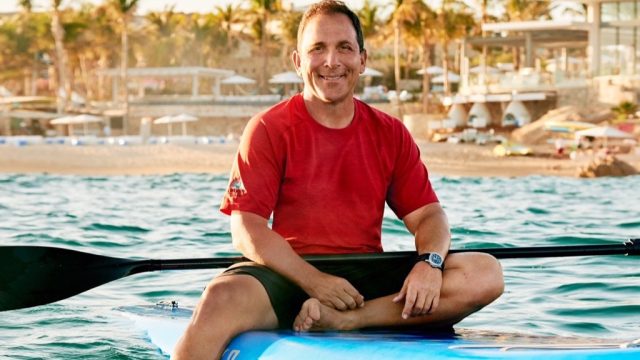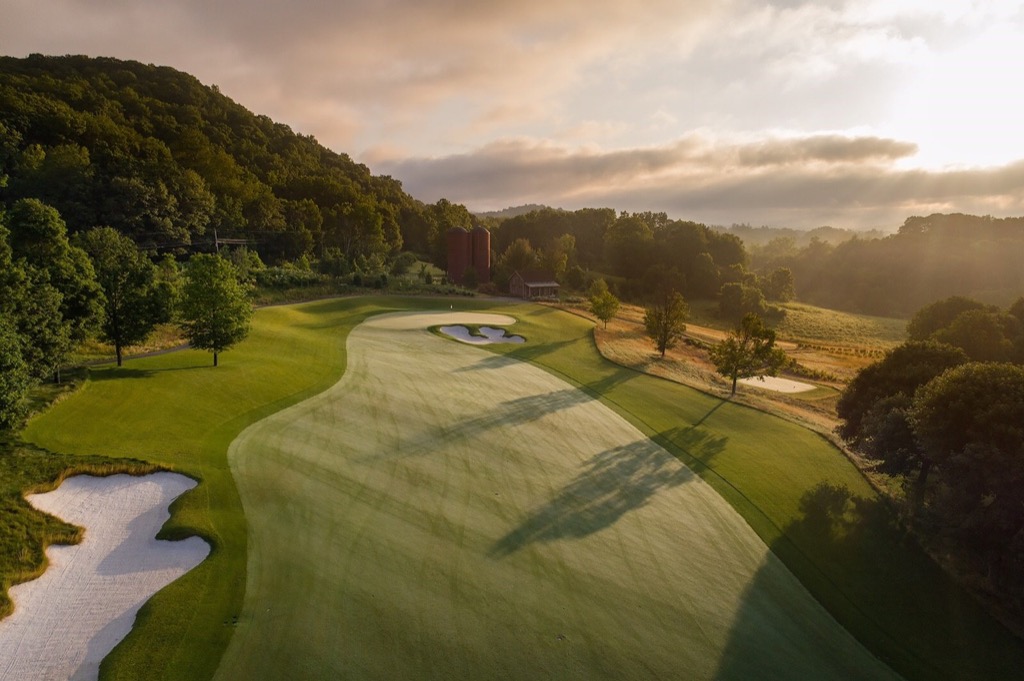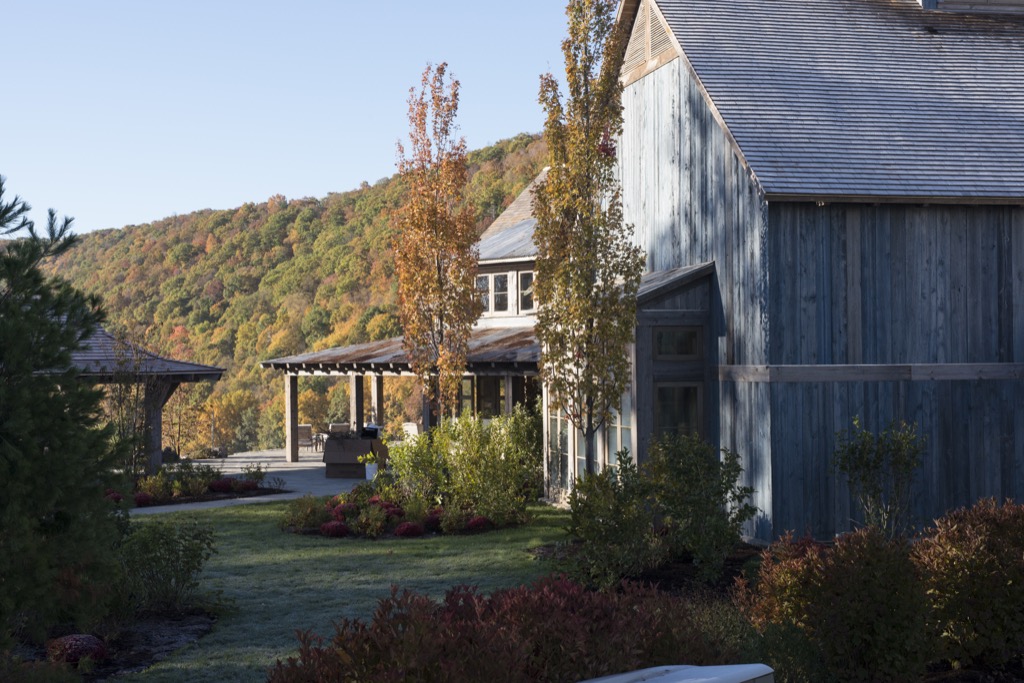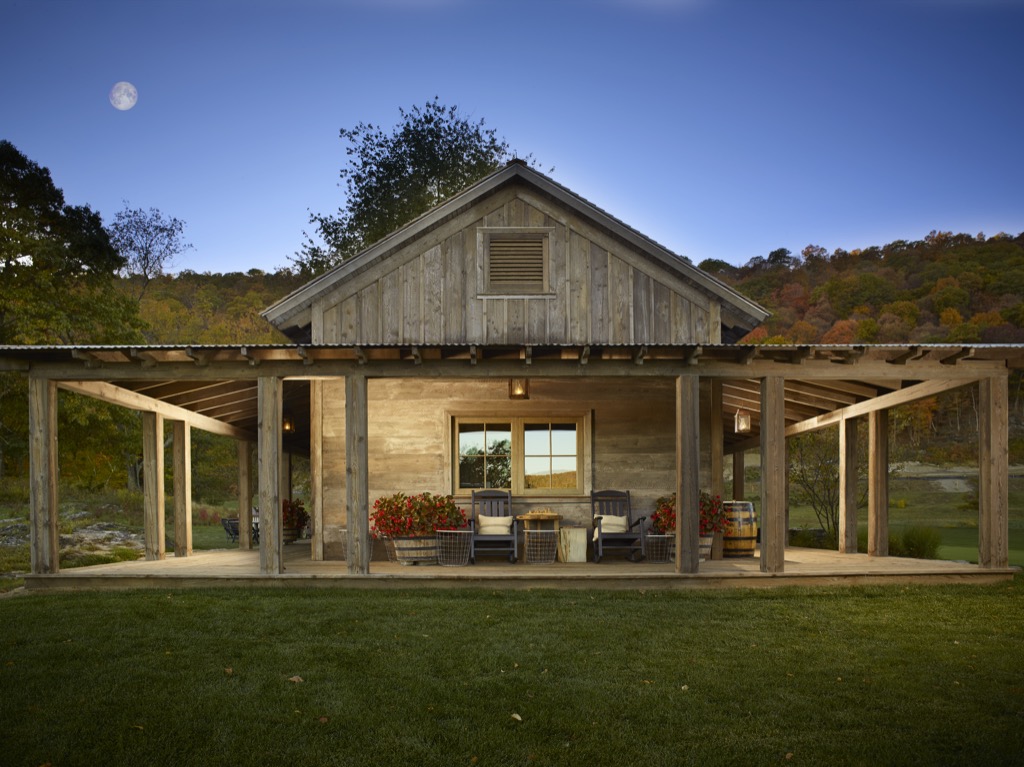Developer and Tequila Tycoon Mike Meldman Talks Real Estate, Fatherhood, and Beer Pong

To step off a dusty commuter train in Amenia, New York, a sleepy town 95 miles north of New York City, and to walk the fifty paces or so to the entrance of Silo Ridge Field Club—an 800-acre upscale private community and golf course—is an exercise in challenging your assumptions.
To begin, no: it’s not a country club. Sure, you’ll find 18 holes of rolling fairways, bunkers, and water hazards here, but don’t expect to encounter a strict dress code, a stuffy air, an over-priced grill (serving stale saltines and cold butter), or a locker room filled with old men playing Five Card Draw in their underwear.
And no, despite the “field club” in its name, don’t expect to find scores of cashmere-clad aristocrats here hunting pheasant or chasing after foxes on horseback.
So what’s the deal with Silo Ridge?

Well, when you walk through its gates—as I did this summer—you’ll first see golfers playing a Tom Fazio-designed course wearing t-shirts and board shorts, and stopping at various sumptuous “comfort stations” along the way, where they avail themselves of treats such as cured duck, craft beer, venison empanadas, and margaritas (from a tap, by the way). Then you’ll see a gym built in an old garage, where the doors lift up for open-air workouts like a CrossFit box. You’ll also see a greenhouse, two pools, a hot tub, and a garden with golden raspberries and fresh vegetables. And if you’re down for some glamping, you’re in luck: you’ll find a teepee tucked away off to the side of one of the greens, on the precipice of a 20-foot bluff overlooking a manmade lake—which, yes, feel free to cannonball off of.
Oh, and that manmade lake? Sure, it’s home to plenty of poorly hit golf balls, but it’s also used for paddle-boarding and kayaking and is lined with a beach covered with sand trucked in from Long Island. And a few hundred feet from the entrance, on a ridge overlooking the course, you’ll find the Ridge House, a restaurant by chef Jonathan Wright (formerly of the Rainbow Room, New York’s landmark restaurant atop Rockefeller Center), where you can order locally sourced—from that aforementioned garden—dishes with things like toasted beets and kale-and-endive salads.

In short, Silo Ridge, which opened 2015 and counts Goldman Sachs traders and all-star athletes—including Tom Brady and former New York Yankee first baseman Mark Teixeira—among its members, is more or less a leisure paradise-on-Earth, a mishmash of everything you’ve ever wanted to do on a summer weekend afternoon all jammed all into one, exclusive place. But to experience the magic, you need to be a member, which only happens if you buy one of the property’s 245 residences—about 80 of which have been sold already—from single-level condos with mahogany beams and cathedral ceilings to 5,000-square-foot houses with slate-encrusted infinity pools and al fresco kitchens. And the whole thing is the brainchild of one man: luxury developer and all-around arbiter of fun, Mike Meldman.
If that name rings a bell, it may be because he’s CEO of Discovery Land Company, which has developed nearly two dozen ultra-high-end private communities all across North America in what might be the world’s most exclusive real estate portfolio. The illustrious Yellowstone Club? Yeah, that’s a Discovery property—as is Gozzer Ranch, the rustic 18-hole destination in Couer d’Alene, Idaho. Oh, and Dune Deck, the beachside escape in Westhampton, is a Discovery property. El Dorado, the swanky A-lister hideaway in Los Cabos, too.
You may also know him for Casamigos, the tequila brand he founded with his friends George Clooney and Rande Gerber in 2013, which they sold to liquor giant Diageo last year for a cool $1 billion. Or maybe it’s the Wall Street Journal headlines like “Developer Mike Meldman Is Real Estate’s Party Boy.” (Meldman, for what it’s worth, categorically denies that assessment.)
Recently, I got a chance to talk to the man behind the magic and pick his brain about a whole host of topics, including Silo Ridge, the game of golf, beer pong, fatherhood, stuffy dress codes, the elusive work-life balance—and what it’s like whip up a billion-dollar business out of thin air (with the coolest of celebrity friends).
[This interview has been edited and condensed for clarity.]
The first thing I noticed at Silo Ridge were the golfers in board shorts. Where did the idea of the dress code come from?
Well, I didn’t grow up like a golfer, so, when I did my first place, my kids were very young, five and six. And I tried to get them in golf shirts, fighting with them, because they didn’t want to wear a collared shirt. So, I just said, “Okay, what am I doing? We’re here to have fun. Why are we fighting over a golf shirt? Forget it. Wear a T-shirt, what do I care?” And then the golf pros at the time were like, “Oh, my God, you can’t do that,” and I was like, “Why?” And they go, “Well, I guess you can, Mr. Meldman.”
That was the beginning of more of the laid-back nature of the dress code. And my attitude is also that these people who buy are successful, good people, and I trust that they know how to act, so I give them the benefit of the doubt. If they wanna dress in T-shirts and board shorts and no shoes and play golf, who am I to judge?

The coolest thing about Silo Ridge: Those “comfort stations” around the course. I heard they were inspired by your own childhood.
Well, I grew up in Milwaukee, so we used to go up to camp and family camp in northern Wisconsin, so a lot of the activities and things like that are just inspired from things I did as a kid, and then things I did with my kids. So it’s all meant to bring you back to the past when life was simpler. You want everything to be a treat, right? Like, everywhere you turn, you want to feel something special is going on, or that you’re being treated to something special.
What’s the most practical lesson your dad taught you?
He always coached our school’s athletic teams, so he taught me basically to be a good sport and have integrity.
Is that something that you’re trying to pass on to your son, as well?
Trying. [laughs] It’s a whole different world. My other sons are now 30 and 28. The beauty of all this is they’ve had obviously a lot—inspired the business, and been a big, big part of it—and one thing I’m so proud about it is they’ve come through this very un-entitled. That’s something I’m really proud of.
Parenthood is a very important topic to us here at Best Life. But we care about career success, too. How do you balance being a businessman and a dad?
I was lucky because my business life was kind of my personal life, and so all these activities that we do were started from me wanting to spend time with my kids. When I did my third project [Iron Horse in Whitefish, Montana], there’s a beautiful golf course and it’s a great recreational area. But being from Milwaukee, I didn’t know how to do anything. Still, I wanted to teach the kids how to wake-board. So we bought a boat and hired a wake-board instructor and a guy to drive it so I could actually be out there with them and enjoy the process, instead of stressing over trying to teach them and drive and not run them over and kill them. It wasn’t a stressful experience, it was a fun one that I was able to directly participate in. I was real lucky that I was able to create a business around spending time with my children.
They’re the inspiration. Without them, I wouldn’t have been as active or engaged in all those other activities. And I just didn’t have that as a child, so it was nice to be able to share that with my children.
It’s no secret that most young professionals today have a lot of trouble balancing work and play. What’s your advice to them?
That’s one reason why I think [Discovery] has been so successful. A lot of our buyers and members are driven people—type-A personalities, successful, successful careers—and I think one of their only regrets is they maybe haven’t spent enough time with their children or their family. The great thing about Discovery is we actually give these people who work so hard some time back to be with their family. I’ve seen it all over, at all of our projects. Reward yourself for hard work and success, but also reward and invest in your family and being with your family.
What’s the best advice you’ve ever been given?
Learn how to golf. [laughs]
What’s the worst advice you’ve ever received in your life?
So my first project was Estancia, back in the early ’90s. These were the RTC [Resolution Trust Corporation] days, where the whole real estate world was upside down and blowing up. And I remember I was flying Southwest from Phoenix to San Francisco. You know the front row that has the six seats that face each other? Two of my buddies from college were in those seats, so I sat with them, and I was explaining what I was going to do in Scottsdale: I was gonna build a golf course. It was going to be the highest-end, most exclusive place in Arizona. And my friend Rob Schumacher—who was a golfer and probably knew a lot more about the business than I did—said, “You’re out of your mind. Don’t ever do it. You’re gonna get killed.” The investment was about $20 million back in the day, which was a lot, is a lot, and he said, “For $20 million, you can go to the RTC and buy Arizona. Why would you do this?”
So I ended up doing it. To date, I think Rob has bought in about a dozen of my projects.
Do you have a number-one tip [for golf]?
The problem I’ve had is I literally have twenty-some golf courses, so I’ve got pros at each place, and they’re all trying to give me the one tidbit of information that’s gonna make me better. All it does is confuse you. Stick with one instructor.
That sounds applicable to more than just golf.
Yeah.
What’s the craziest thing you’ve ever blown money on?
Probably planes and art.
What’s the soundest purchase you’ve ever made?
Oh, Casamigos, for sure.
Yes, congrats! You’re still very much involved in the day-to-day, right?
Yeah, we’re basically only a subsidiary of Diageo [the liquor industry giant], so we all run the company day-to-day.
That holy trinity—you, George [Clooney], Rande [Gerber]—how did that come to be?
We all had houses in El Dorado, my project in Cabo, and we just created a tequila that we liked for ourselves. It wasn’t really meant to market or sell, but as we drank it and shared with everyone, everyone said, “You should sell it—in stores and in bars!” We liked it, everyone liked it, so we just knew it was going to work. Then, we went to Southern Glazer’s Wine and Spirits, who’s our distributor. They liked it, and said they would help, and poof! Next thing you know, we’re a billion-dollar company.
I understand that you know how to throw a really killer party. What are the keys to pulling off the perfect party?
Ingredient number one: Lots of Casamigos. [laughs] Next: have a lot of food—a lot of good food, and a lot of fun food—because one thing people don’t do when throwing parties is have enough food, and if you don’t have enough food, people get too drunk. At least if you have food, people can drink and enjoy themselves more. Finally, invite an eclectic group of people. If you’re successful in one business, you meet successful people in other businesses, so it makes the whole thing more enjoyable.
Rumor has it you’re a monster at beer pong—just dominate everybody you play.
[laughs] Yeah, I’m good at beer pong. But I’m also a good strategist at beer pong. So my great ploy in beer pong is, between matches, I’m not doing shots like everyone else, so I stay relatively sober. I’m also the king of the “death cup,” which means, if your teammate hits—my sons are really good too, so the three of us together were dominant—I follow up quickly with the back-up shot into the same cup for death cup. Game over.
So what’s next for Discovery? Are you going international? Europe? East Asia?
We’ve got a couple new projects going, one in Nashville, one in Austin. We’d like to look in Europe, we keep seeing opportunities. And we’re looking in the Middle East, and China—all over, really, ’cause we feel our form of resort and luxury translates to all other markets. The closer this type of luxury product is to [your] home, the easier it is to use. If you’re in Dubai or Beijing, or wherever you are, it translates to any market, this form of luxury. If we have the right partner and the right opportunity present itself, I think we can go anywhere.
To discover more amazing secrets about living your best life, click here to sign up for our FREE daily newsletter!